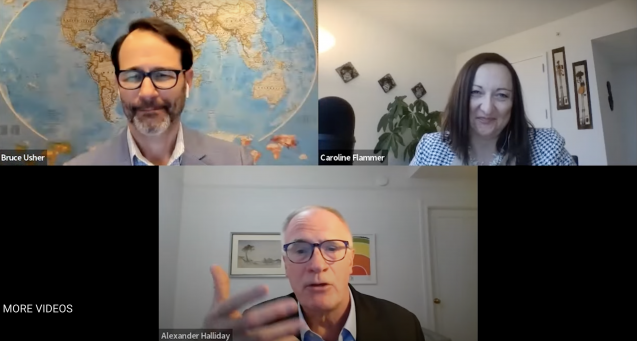Investors Play a Crucial Role in Solving Climate Change
“The goal of decarbonizing our society is necessary and urgent. It will demand ingenuity, but also investment,” said Columbia Climate School Founding Dean Alex Halliday during an event in late March. Titled “Financing the Future: Investors and the Climate Crisis,” the event’s discussions and takeaways speak to the importance and relevance of the Earth Day 2023 theme, “Invest in Our Planet.”
With Halliday as the moderator, sustainable investing expert Caroline Flammer and investor Bruce Usher shared their insights. Flammer is a professor at the Climate School and Columbia’s School of International and Public Affairs. Usher is a member of the Climate School faculty and co-director of the Tamer Center for Social Enterprise at Columbia Business School.
The tools needed to wean our society off of fossil fuels already exist, but major investments are necessary to bring them to scale; it may cost a total of $100-200 trillion to get to net zero within the next 30 years. While those figures may seem daunting, Usher said that it boils down to about $3-6 trillion a year, equating to a small piece of today’s global capital markets, which are over $100 trillion.
Business opportunities
Usher and Flammer think that investing in climate change solutions can pay off for both individual investors as well as companies.
As an investor himself and the former CEO of a company working on emissions reduction projects in developing countries, Usher focused on individual-level opportunities.
“Tackling climate change is resulting in dramatic changes in how we invest capital, where we invest, and the opportunities that go with it,” he said. “As an investor, change is what creates opportunity. Change is what allows one to invest in new and exciting areas.”
Usher said that he sees the most promising investment opportunities in wind and solar energy and electric vehicles. These are already cost-competitive and are better products than the alternatives, he said. Batteries and other energy storage technologies, as they approach cost-competitiveness, are another promising investment arena. Finally, green hydrogen and direct air capture of carbon — while not yet cost-effective, are “extremely exciting,” he said.
Flammer took a broader focus, looking at the benefits at the company level. In her research, she has found that socially and environmentally responsible practices can improve a company’s competitiveness, innovativeness, and shareholder returns, in addition to enhancing employee satisfaction and talent retention.
Investment in decarbonization
While Flammer thinks that government regulation is the best way to move our societies away from fossil fuels, she noted that investments can also play a large role in decarbonization. Government action “is just not sufficient,” she said. “That puts pressure on the private sector; What can the private sector do, and to what extent, to help mitigate these grand societal challenges, including climate change?”
Flammer cautioned that divestment — selling off investments involved with fossil fuel companies — may not be the most powerful move investors can make, because while they may be cleaning up their own portfolio, they are merely shifting those investments to someone else. What would be more powerful, she advises, is for shareholders to pressure those companies to clean up their business practices.
“In addition, investors can engage with policymakers to try to trigger systemic change,” said Flammer.
Usher, by contrast, prioritizes private sector investment over government directives in driving decarbonization. That’s because, according to Usher, private investment is better at driving innovation and scaling up solutions. He thinks that the role of government should be to provide subsidies to trigger private sector investments, and “to smooth the path for innovation and scaling.”
The risk of greenwashing
Both experts cautioned against greenwashing in the investment space.
“You can see a lot of companies making promises and not living up to those promises,” said Usher. “It’s because all of the reporting is voluntary. It’s complete chaos out there.”
The U.S. Securities and Exchange Commission (SEC) is considering a rule that would require companies to disclose their greenhouse gas emissions and climate-related risks to investors. “It would be a major improvement,” said Flammer, but she warned that companies could still find workarounds.
The problem with the SEC’s proposal, she explained, is that it would only require a company to report greenhouse gas emissions that come from sources that it directly owns or operates, plus emissions from its use of electricity, steam, heat, or cooling. The proposal doesn’t include indirect “scope 3” emissions, meaning those that come from other parts of the value chain that the company doesn’t own. For example, the emissions used to create a component that the company buys and uses in its products, or the emissions that come from disposing of its finished product when it is no longer useful.
Flammer’s concern is that if scope 3 emissions aren’t included in the SEC proposal, the company could outsource its more emissions-intensive operations, transforming them into scope 3 emissions. In other words, said Flammer, “It looks like they’ve cleaned up their act, but nothing changes because they shift their emissions to somebody else.”
Prime time for green investing
Why is now the right time to invest in climate change solutions?
For one thing, “there’s a lot to invest in,” said Usher. Solar power has grown almost exponentially since he was starting out in this sector 20 years ago, and many other solutions have become commercially competitive as well. There has also been a cultural shift, said Usher: “Consumers want to buy products that are more sustainable.”
A graph shows the rapid rise in solar power over the past decade or so, plus projections for 2030. Source: International Energy Agency
“The trends are pretty clear: fossil fuels are being replaced by renewable energy,” said Usher. “The hard part is figuring out which companies are going to win. Are you going to be the next Tesla, or the next Kodak? That’s hard to predict.”
The world needs to wean itself off of fossil fuels very quickly in order to stave off the worst impacts of climate change. That’s a tall order, and it will take every tool we have, including smart investing.
A strong sign of progress, Usher pointed out, is that several countries have managed to unlink economic growth from carbon emissions. That includes the U.S., whose emissions peaked in 2007 but the country has still managed to have strong economic growth in the years since. Such an achievement would have been impossible merely 20 years ago, said Usher.
There’s still a long way to go to get emissions down to zero in the next 30 years, but Usher is pragmatically optimistic:
“We have the solutions to decarbonize. We have the capital to decarbonize. And I think we need to recognize that, and then just get to work and implement those solutions.”















